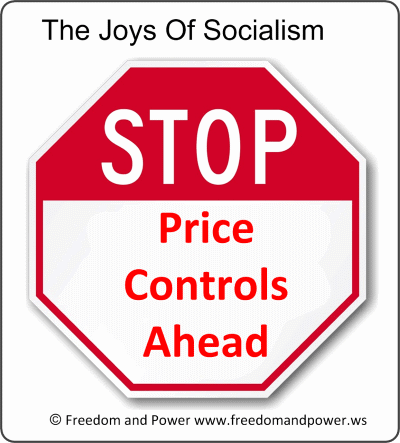 Governments and their bureaucracies never sleep since they are busy implementing “initiatives” for the greater good. One such initiative is the Philippine “Price Act” (Republic Act No. 10632) which is called “An Act providing protection to consumers by stabilizing the prices of basic necessities and prime commodities and by prescribing measures against undue price increases during emergency situations and like occasions and for other purposes”
Governments and their bureaucracies never sleep since they are busy implementing “initiatives” for the greater good. One such initiative is the Philippine “Price Act” (Republic Act No. 10632) which is called “An Act providing protection to consumers by stabilizing the prices of basic necessities and prime commodities and by prescribing measures against undue price increases during emergency situations and like occasions and for other purposes”
The original idea (quite dumb) was to force price controls in the event of emergencies, yet, bureaucrats decided that this wasn’t enough and that it was their duty to implement these controls regardless of the situation. They began to implement the “Suggested Retail Price” (SRP) as mandatory. From that point on things began to spiral out of control. Things got so bad that the Department of Justice’s Office for Competition released a report on the SRP. It’s mains points are:
- There are no adequate rules to implement the SRP
- Government agencies expanded the SRP to all kinds of non-emergency situations
- While the SRP is “laudable”, it “could” prevent competition
Let’s think about this for a second… or two. The government created a law that deeply disturbs free markets. They did so without a second thought and without placing the logistics of it in place. Consequence? This law is being used for political purposes. It is a godsend for politicians who can now bring low, low prices to the voters in their ridings… all to the expense of greedy retailers and their partners in crime the wholesalers and manufacturers. Surprised? No. Furthermore, we can see the moralistic (and economically erroneous) concept of calling this law “laudable”. How exactly is the interference with free markets “laudable” knowing that it will only lead to less products at higher prices? This is yet another government mystery.
But there is more.
Under the current law and regulations, the suppliers of specific products need to submit supporting documents to the government (to prevent “price manipulation”). The government then uses this information to determine price trends for the following month price increases. This information is “validated” against industry data and “other” government agencies data. This entire process is used to determine whether the propose price hike is justified or not.
Basically, this is fascism. No, we are not kidding. Study the economic laws and regulations under the Reich (the Third – yes, that one) and you will begin to see the parallels. Yes, the means of production are in private hands but the final determination of prices remains in government hands.
What this means is that producer and suppliers need to spend countless hours/days gathering useless information for submission to useless apparatchiks to ask for permission to raise prices… prices that are constantly being affected by inflation. Not to mention the fact that yes indeed, the arbitrary assignment of prices destroys competition.
This is nothing but a clear example of government bureaucracy expanding in an attempt to cover everything. The fact that bureaucrats enforced “Suggested” prices (including penalties) is incidental. What is important is to understand how they took over in an ever-expanding fashion. It is this drive to control everything that makes any government bureaucracy dangerous and thus any solution including it, unreal.
But perhaps Philippine people will benefit from SRPs. They will get low, low prices…until there won’t be anything else to buy. Just like in the Venezuelan worker’s paradise. Yeah… we need more of this stuff…yeah…
Note: please see the Glossary if you are unfamiliar with certain words.

